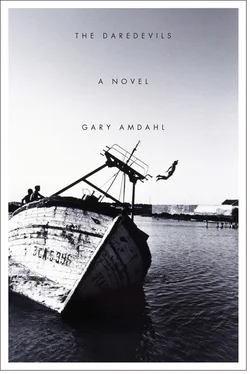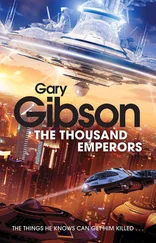“But Vera,” said Pastor Tom, “surely you are guilty to some degree of the very charges you level against us?”
“Not at all. I have no expectation—”
“Isn’t everyone guilty?” asked Amelia.
“— no expectation of anything remotely like success or change or gain — certainly not increased power. I merely act. I despise power. I love to act.”
“You love to act but have no regard for consequence?” asked Andrew.
“You’re being naïve or foolish or selfish,” said Amelia.
“I don’t care if I live or die.”
“Nonsense,” said Amelia.
“I’m not here to convince you of a thing.”
“Well, neither am I, I guess,” said Andrew. “So allow me to be frank and revealing and come swiftly to my point as well.”
“Please do. I’m sorry I am so rude and cold.”
“There have always been, in my world, in Father’s world, people who were outright villains. And if not exactly, actionably so, at least detestable and ‘worse people’ than we were. I think primarily of the railroaders. The engineers and builders were men of science—”
“And slave drivers too,” said Vera. “Racist slave-driving profiteers.”
“You can no longer apologize for being rude and cold,” said Amelia.
“I no longer wish to.”
“Perhaps because we were so focused on the railroad men, we failed to take notice of all the other. characters entering the stage. There were suddenly so many factions, and agents within factions whose motives were never clear, that we became confused. We became confused because we wished to continue to think well of ourselves, and not throw in with anybody who we thought might be worse than we were. We wished, for example, to continue to think of men of science as the clear-thinking, politically neutral allies of the progressive spirit of reform — which was itself a kind of clear-thinking political science. But for every one of those, there were — suddenly, it seemed — ninety-nine of the other. Worse, for every good man and every bad man there were ninety-eight people milling around, haplessly, irrevocably human — and maybe that’s why we found our Christianity, our social gospel, our progressivism to be such a. a fortress. It accommodated good and evil and everybody just bobbing along in the river of whatever this is. God wasn’t dead, but if you will allow me to use a popular catchphrase, we were beyond good and evil, beyond bliss of heaven and the torture of hell. Beyond spirit and matter — which is I think what Chick’s been talking about all this time.”
Charles said nothing and chose not to alter his gaze, even though the last line of Andrew’s speech had been a clear and sincere appeal to not just brotherhood, but an understanding that had grown directly from obsessions officially ignored by the family: of a great moment, in other words, and probably unprecedented, but embarrassing, as if any application of the “reality versus illusion of reality” paradox to what most people insisted on thinking of as “reality” must always be somehow embarrassing — as theater must always be somehow embarrassing.
Andrew drooped. No one else was willing or able to say what he had wanted to say, what he had hinted at.
“Get beyond power and glory,” said Charles at last, “let me know.”
“I no longer have much faith in the goodness of those ninety-eight other people.”
“Ah,” said Pastor Tom.
“Faith comes and faith goes,” said Amelia. “I speak from personal experience. The important thing is to be seeking it.”
“Well that’s just it, isn’t it? I no longer have the slightest interest in seeking it.”
“Ah,” said Pastor Tom.
“The meek will inherit the earth by taking tips from tyrants.”
Pastor Tom waited a beat, then said “ah” again, with a kind of finality and rigorous sadness.
“Now is precisely the time to stand up and shake off despair, Andy,” said Amelia. “There is really no other time to do it.”
“A despairing person, Amelia, doesn’t give a hoot for standing up. And shaking it off doesn’t even enter the question.”
“But it does, Andy, truly it does.”
“Now is when it counts,” said Pastor Tom. “Now is when it matters.”
Amelia, Pastor Tom, and Andrew all now had tears visibly filling their eyes.
“Father is coming here,” said Andrew. “He wants to talk to you generally about political marketing practices, and specifically about who you may be aligned with.”
“We know who we are aligned with.”
“Well then maybe you can just tell Father that.”
“I can’t tell him not to come, I suppose.”
“I believe he’s already on his way.”
“And Mother?”
“Mother’s on her way to Rome. Unless you make a trip there yourself, I doubt you will ever see her again.”
“What about Al?”
“Al is busy trying to make the case to whoever will listen that innocent men are in prison and that the bombers — people he thinks, believes with all his heart, were trying first and foremost to kill his little brother — are walking around looking for the next opportunity. You can imagine how long he will remain viable in Sacramento.”
Vera began to weep loudly.
Charles paled frighteningly.
Father did not make his train. He had died while anxiously — everyone remarked the oddity of it — supervising the packing. Charles chose not to go to the funeral, which, because it was immediate and small and simple, he stood a good chance of missing anyway, even if he dropped everything and raced across the country. The show, he felt, must go on. He cabled Mother and told her that the show would go on willy-nilly. Nothing had been lost that could not be easily and swiftly replaced. He thought he finally understood how such a motto could be perceived as something other than cold and brutal.
He was, in other words, sorry that Father was dead, but was determined to not go to pieces over it.
They went north by northwest. As the train swayed and night fell past it and down — the darkness appearing to be wind-borne — a condition of dreamy contentment swept gently over Charles, almost returning him to an unspoiled San Francisco, a moment of twilight from very early in his childhood.
It assuaged the featureless dread that slept in every moment, and the homesickness for that lost family, and the guilt, the mute guilt that would not describe to him what he was doing wrong. He had a list, but could get no answer, the guilt staring hotly at the drowsing dread, either fearful of its awakening, or impotently desirous of it.
But in that swoon he became quietly determined, as one can only become in sleep or near sleep, to banish the old soul and find a new one. What could be finer than to become a new person overnight? To stay fixed in a role too long was a kind of mental illness, was it not? It was likely now that he would enlist. The country was going to hell. He certainly wasn’t going to lead men to certain death on its behalf, certainly would not die for it — no, not for it, not die for anything, but simply confront the Great Illusion in what had always been known as the Theater of War.
The dreaminess was interrupted — he thought the cause was some untoward motion of the rocking hurtling train that he could not immediately pinpoint — by swellings of unease, dread’s eyes heavy-lidded but open, in which he was forced to wonder a little anxiously who he was, if no longer himself. Deep drifts of black-needled trees clustered blurrily, enveloped his view like a storm cloud, then burned off like fog, like a dream shredding itself into streamers of the real and the unreal, revealing what at first, in dark but overexposed flashes, seemed a flat and empty ocean of tallgrass. Towns were advanced upon like islands, mounds of earth humped up out of marshes and built upon strangely, with an air of tidal forces having been abrogated only for a short time. and stranger still, within that vast sea, lakes, the inverse of the mounded villages, benthic settlements as if the land of the towns had been quarried and the pits filled with water. On the map, unfolded carefully so as not to disturb the slowly spreading concentric circles waving out from his brain, and glimpsed in the flare and slow blackening of a long wooden match, were plotted these thousands of lakes, in shapes that could be repeated nowhere in nature and with names that could not have been suggested by their shapes, only by private and unreadable histories. In the no-man’s-land of the train at night, he recollected murmurs of science, lectures he’d audited at Berkeley, discussions between fiercely committed but quiet, articulate, idealistic men. What had they said? That these northern lakes, lying shallowly like mirrors on the face of the plain, had been formed when great blocks of ice, remnants of glaciers buried in outwashed alluvial dirt, had at long last melted? So that these lakes actually rose up from below, welled up rather than gathered?
Читать дальше












